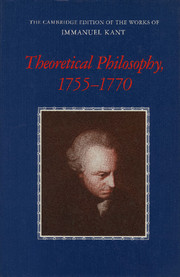Book contents
- Frontmatter
- Contents
- General editors' preface
- Preface
- Guide to abbreviations
- General introduction
- Introductions to the translations
- Résumés of the works
- A NEW ELUCIDATION OF THE FIRST PRINCIPLES OF METAPHYSICAL COGNITION (1755)
- Purpose of the undertaking
- Section 1 Concerning the principle of contradiction
- Section 2 Concerning the principle of the determining ground
- Section 3 Presentation of the two principles of metaphysical cognition
- THE EMPLOYMENT IN NATURAL PHILOSOPHY OF METAPHYSICS COMBINED WITH GEOMETRY, OF WHICH SAMPLE I CONTAINS THE PHYSICAL MONADOLOGY (1756)
- AN ATTEMPT AT SOME REFLECTIONS ON OPTIMISM (1759)
- THE FALSE SUBTLETY OF THE FOUR SYLLOGISTIC FIGURES (1762)
- THE ONLY POSSIBLE ARGUMENT IN SUPPORT OF A DEMONSTRATION OF THE EXISTENCE OF GOD (1763)
- ATTEMPT TO INTRODUCE THE CONCEPT OF NEGATIVE MAGNITUDES INTO PHILOSOPHY (1763)
- INQUIRY CONCERNING THE DISTINCTNESS OF THE PRINCIPLES OF NATURAL THEOLOGY AND MORALITY (1764)
- M. IMMANUEL KANT'S ANNOUNCEMENT OF THE PROGRAMME OF HIS LECTURES FOR THE WINTER SEMESTER 1765 — 1766 (1765)
- DREAMS OF A SPIRIT-SEER ELUCIDATED BY DREAMS OF METAPHYSICS (1766)
- CONCERNING THE ULTIMATE GROUND OF THE DIFFERENTIATION OF DIRECTIONS IN SPACE (1768)
- ON THE FORM AND PRINCIPLES OF THE SENSIBLE AND THE INTELLIGIBLE WORLD [INAUGURAL DISSERTATION] (1770)
- Factual notes
- Bibliographies of editions and translations
- Glossary
- Biographical-bibliographical sketches of persons mentioned by Kant
- Index
Section 1 - Concerning the principle of contradiction
Published online by Cambridge University Press: 18 December 2014
- Frontmatter
- Contents
- General editors' preface
- Preface
- Guide to abbreviations
- General introduction
- Introductions to the translations
- Résumés of the works
- A NEW ELUCIDATION OF THE FIRST PRINCIPLES OF METAPHYSICAL COGNITION (1755)
- Purpose of the undertaking
- Section 1 Concerning the principle of contradiction
- Section 2 Concerning the principle of the determining ground
- Section 3 Presentation of the two principles of metaphysical cognition
- THE EMPLOYMENT IN NATURAL PHILOSOPHY OF METAPHYSICS COMBINED WITH GEOMETRY, OF WHICH SAMPLE I CONTAINS THE PHYSICAL MONADOLOGY (1756)
- AN ATTEMPT AT SOME REFLECTIONS ON OPTIMISM (1759)
- THE FALSE SUBTLETY OF THE FOUR SYLLOGISTIC FIGURES (1762)
- THE ONLY POSSIBLE ARGUMENT IN SUPPORT OF A DEMONSTRATION OF THE EXISTENCE OF GOD (1763)
- ATTEMPT TO INTRODUCE THE CONCEPT OF NEGATIVE MAGNITUDES INTO PHILOSOPHY (1763)
- INQUIRY CONCERNING THE DISTINCTNESS OF THE PRINCIPLES OF NATURAL THEOLOGY AND MORALITY (1764)
- M. IMMANUEL KANT'S ANNOUNCEMENT OF THE PROGRAMME OF HIS LECTURES FOR THE WINTER SEMESTER 1765 — 1766 (1765)
- DREAMS OF A SPIRIT-SEER ELUCIDATED BY DREAMS OF METAPHYSICS (1766)
- CONCERNING THE ULTIMATE GROUND OF THE DIFFERENTIATION OF DIRECTIONS IN SPACE (1768)
- ON THE FORM AND PRINCIPLES OF THE SENSIBLE AND THE INTELLIGIBLE WORLD [INAUGURAL DISSERTATION] (1770)
- Factual notes
- Bibliographies of editions and translations
- Glossary
- Biographical-bibliographical sketches of persons mentioned by Kant
- Index
Summary
WARNING: Since I am particularly concerned to be brief in this treatise, I think it better here not to copy out afresh the definitions and axioms which are firmly established in ordinary knowledge and which are consonant with right reason. Nor do I think it a good idea to follow the example, by imitating their practice, of those who, slavishly bound by I know not what method, only deem themselves to have proceeded in a rational fashion if they have scrutinised from beginning to end whatever they find on the bookshelves of philosophers. I have thought it good to warn the reader of this in advance, lest he take for a fault that which I have done deliberately.
Proposition I. There is no UNIQUE, absolutely first, universal principle of all truths.
A first and truly unique principle must necessarily be a simple proposition; if it covertly embraced a number of propositions it would merely present the deceptive semblance of a unique principle. If, therefore, a proposition is truly simple, it must be either affirmative or negative. But I maintain that if it is one or the other, it cannot be universal and subsume under itself all truths whatever. For, if you say that it is affirmative, it cannot be the absolutely first principle of all negative truths; and if you say that it is negative it cannot take command of the positive truths.
Let us suppose, namely, that the proposition is negative. Who is there who does not see that, since the logical derivation of all truths from their principles is either direct or indirect, it is not possible, firstly, to deduce anything from a negative principle by the direct method of inference except negative conclusions? If you then go on to insist that affirmative propositions flow from that negative principle indirectly, then you will acknowledge that this can only happen by means of the following proposition: everything of which the opposite is false, is true.
- Type
- Chapter
- Information
- Theoretical Philosophy, 1755–1770 , pp. 6 - 10Publisher: Cambridge University PressPrint publication year: 1992



